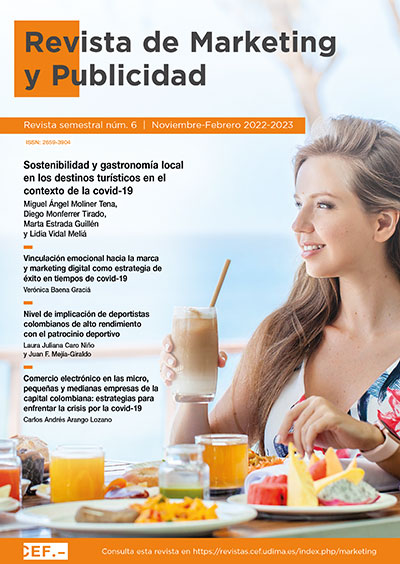Level of involvement of high-performance Colombian athletes with sports sponsorship
DOI:
https://doi.org/10.51302/marketing.2022.4691Keywords:
sports marketing, sport’s sponsorship, high-performance, involvement, sponsoring brands, brand positioning, sports advertisingAbstract
The objective of the article is to determine the level of involvement of high-performance Colombian athletes with the brands that sponsor them. For this, a qualitative methodology was used, under a phenomenological-interpretative approach. As data collection method, a netnographic study was carried out on the social network Instagram, taking into account the profiles of the athletes who did mention their respective sponsor brands. This study was carried out using the publications made between the months of September and November of the year 2021, additionally 15 interviews were conducted with high-performance Colombian athletes from different disciplines. Among the main findings of this study are the non-existing requirements of the sponsoring brands to the sponsored athletes and the management of the digital platforms. A situation that is worrying since nowadays a fundamental factor in the world of sport’s sponsorship is the visibility of the brand through social networks. On the other hand, it was also identified in most of the athletes interviewed who have had more than two or three sponsorships, that there is always a greater affinity towards one of the sponsorships. This becomes a relevant fact due to the benefits it brings to brands, given that several of the athletes stated, on one hand, that they acquired greater loyalty towards that brand or sponsorship with which they develop a better connection, and on the other hand, they became more cautious about the correct use of the brand in order to avoid any public scandals since this is one of the main risks that the company encounters when deciding to carry out a sponsorship.
Downloads
References
Biscaia, R., Correia, A., Boleto, A., Ross, S. y Marôco, J. (2013). Sport Sponsorship: The Relationship Between Team Loyalty, Sponsorship Awareness, Attitude Toward the Sponsor, and Purchase Intentions. Journal of Sport Management, 27(4), 288-302. https://doi.org/10.1123/jsm.27.4.288
Bloxsome, E. (2012). Studies of the off-field behaviours of sportspeople: ¿are sponsors’ objectives at risk? [Tesis doctoral, Queensland University of Technology]. Repositorio Institucional Queensland University of Technology. https://eprints.qut.edu.au/60920/
Cabezuelo, F., Gonzálvez, J. y Viñarás, M. (2015). En la cima del patrocinio deportivo. Análisis de un caso con altas cotas de éxito en el nuevo contexto digital. aDResearch: Revista Internacional de Investigación en Comunicación, 12, 8-27. https://doi.org/10.7263/adresic-012-01
Cabrera, F. C. (2005). Categorización y triangulación como procesos de validación del conocimiento en investigación cualitativa. Theoria, 14(1), 61-71. https://www.redalyc.org/articulo.oa?id=29900107
Competize (2022). Patrocinadores deportivos ¿Cómo y dónde buscar patrocinios? https://www.competize.com/blog/patrocinadores-deportivos-marcas-patrocinios
Cumplido, C. (2018). Efectos del patrocinio deportivo. [Trabajo de grado, Universidad de Sevilla]. Repositorio Institucional Universidad de Sevilla. https://idus.us.es/handle/11441/88348
Duque, H. y Aristizábal Díaz Granados, E. T. (2019). Análisis fenomenológico interpretativo: Una guía metodológica para su uso en la investigación cualitativa en psicología. Pensando Psicología, 15(25), 1-24. https://doi.org/10.16925/2382-3984.2019.01.03
EAE Business School (2018). Marketing y deporte: El impacto de los deportistas famosos en la comunicación empresarial. https://www.eae.es/el-impacto-de-los-deportistas-famosos-en-la-comunicacion-empresarial
EAE Business School (2020). ¿Qué beneficios tiene el patrocinio deportivo para las marcas? https://www.eae.es/actualidad/noticias/que-beneficios-tiene-el-patrocinio-deportivo-para-las-marcas
Escorihuela, A. (2022). Marketing deportivo o publicidad deportiva: qué es, tipos y ejemplos. https://www.inboundcycle.com/blog-de-inbound-marketing/marketing-deportivo-que-es
Ferrari, S. de, Feijoo, B. y Guerrero, J. J. (2020). Los deportistas de élite como embajadores de marca en Chile: Análisis de la estrategia de comunicación en redes sociales de las nuevas generaciones en deportes minoritarios. La Trama de la Comunicación, 24(120), 39-53. https://www.redalyc.org/articulo.oa?id=323963331002
Forbes (2020). Los atletas mejor pagados del mundo 2020: Federer desbanca a Messi. https://forbes.co/2020/05/29/negocios/deportes/los-atletas-mejor-pagados-del-mundo-2020-federer-desbanca-a-messi/
Foster, G., Greyser, P. y Walsh, B. (2006). The business of sports: Texts and cases on strategy and management. Thomson.
García Tramón, J. (2017). El «Primer Estudio sobre el Estado del Patrocinio Deportivo en España». Revista Aranzadi de Derecho de Deporte y Entretenimiento, 54, 577-581. https://dialnet.unirioja.es/servlet/articulo?codigo=5898688
Guerrero Bejarano, M. A. (2016). La Investigación Cualitativa. INNOVA Research Journal, 1(2), 1-9. https://doi.org/10.33890/innova.v1.n2.2016.7
Guillén Pereira, L., Martínez Gil, L., y Montano Rodríguez, F. (2018). La responsabilidad social en el marketing deportivo. Universidad y Sociedad, 10(2), 175-180. http://rus.ucf.edu.cu/index.php/rus
Jurado, D. (2015). Marketing deportivo. «Una recolección de definiciones». [Trabajo de grado, Institución Universitaria Esumer]. Repositorio Institucional Institución Universitaria Esumer. https://repositorio.esumer.edu.co/bitstream/esumer/412/2/Esumer_marketing.pdf
La República (2019). El retorno de inversión por apoyo deportivo es entre 20 y 25 veces la inversión. https://www.larepublica.co/empresas/retorno-de-inversion-por-apoyo-deportivo-es-de-25-en-promedio-en-medios-2904971
Marín Montín, J. (2010). Valores mediáticos del deportista profesional en la publicidad: análisis comparativo entre Rafa Nadal y Gemma Mengual. Revista Comunicación, 8(1), 26-40. https://idus.us.es/bitstream/handle/11441/11755/file_1.pdf?sequence=1&isAllowed=y
Munnukka, J., Karjaluoto, H., Mahlamäki, T. y Hokkanen, V. (2017). Effects of Social Media on Consumers’ Sports Brand Experiences and Loyalty. En M. Stieler, Creating Marketing Magic and Innovative Future Marketing Trends (pp. 1.051-1.064). Springer International Publishing.
Rodríguez, S. (2019). ¿Qué le ven las marcas al fútbol nacional? https://www.elcolombiano.com/negocios/empresas/por-que-las-marcas-se-interesan-en-el-futbol-colombiano-IC10478123
Sobrino, R. (2018). Los deportistas se adueñan de las marcas. Cinco Días. https://cincodias.elpais.com/cincodias/2018/07/20/fortunas/1532110436_479017.html
Tonon, G. (2012). Reflexiones latinoamericanas sobre investigación cualitativa. Revista Latinoamericana de Ciencias Sociales, Niñez y Juventud, 8(1). https://revistaumanizales.cinde.org.co/rlcsnj/index.php/Revista-Latinoamericana/article/view/606
Turpo Gebera, O. W. (2008). La netnografía: un método de investigación en Internet. EDUCAR, 42, 81-93. https://www.redalyc.org/articulo.oa?id=342130831006
Úbeda, V. (2014). ¿Por qué los atletas no consiguen patrocinios? http://www.vicenteubeda.com/por-que-los-atletas-no-consiguen-patrocinios/
Valero, A. (2016). 5 claves del diseño de un dossier para patrocinadores. https://albertvalero.com/dossier-patrocinadores/
Zamora Saborit, J., Sanahuja Peris, G. y Blay Arráez, R. (2015). El gestor de marca personal en el ámbito deportivo. Questiones Publicitarias, 20, 101-116, https://raco.cat/index.php/questionespublicitarias/article/view/349703
Zapata Agüera, S. y Martínez Caro, L. (2017). El nivel de implicación del consumidor con el deporte y su influencia sobre la imagen del esponsor y el evento, y la intención de compra en el patrocinio deportivo. Redmarka. Revista de Marketing Aplicado, 2(19), 83-108. https://doi.org/10.17979/redma.2017.02.019.4855
Downloads
Published
Versions
- 2022-11-07 (2)
- 2022-11-07 (1)
How to Cite
Issue
Section
License
Copyright (c) 2022 Laura Juliana Caro Niño, Juan Felipe Mejía Giraldo

This work is licensed under a Creative Commons Attribution-NonCommercial-NoDerivatives 4.0 International License.





















